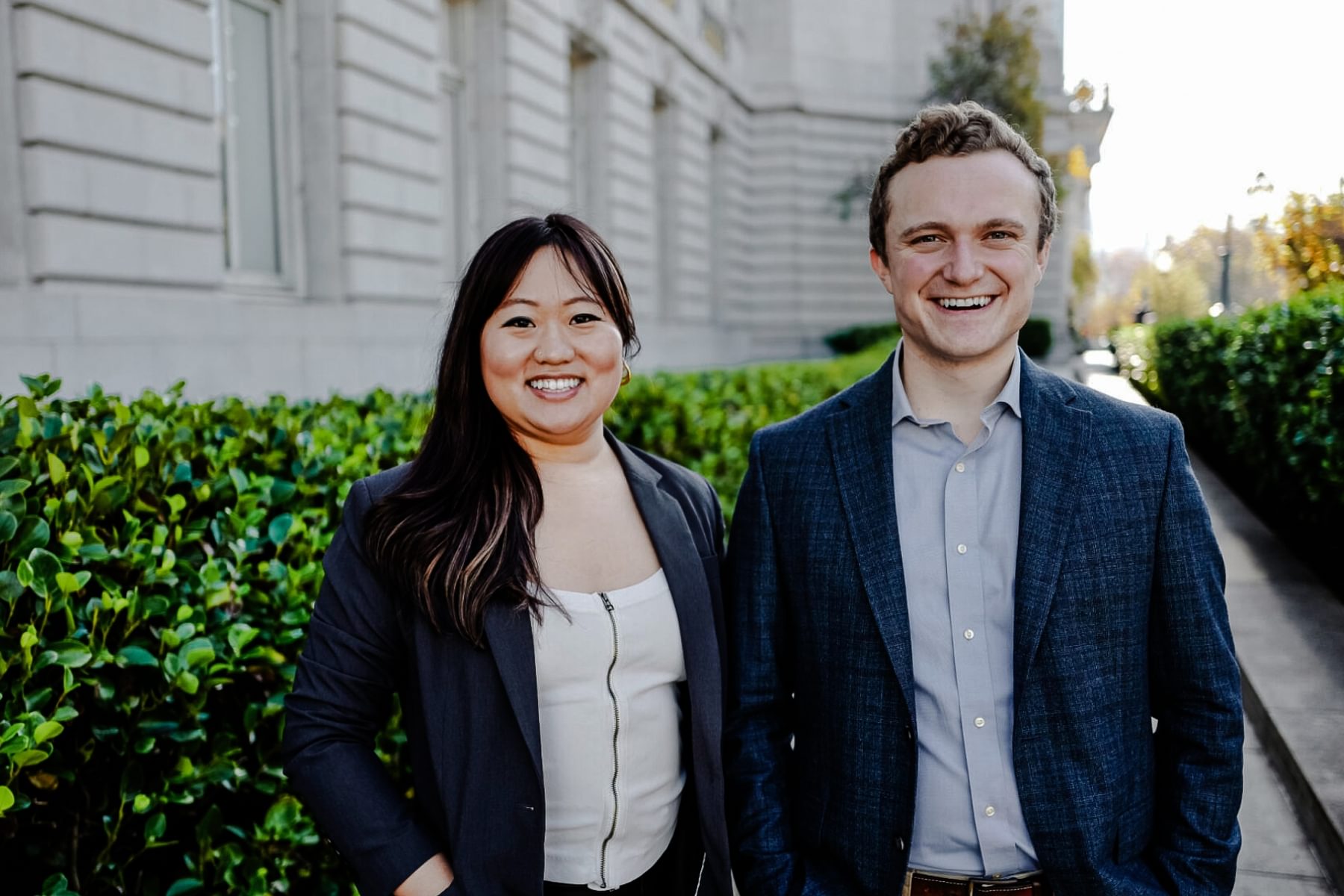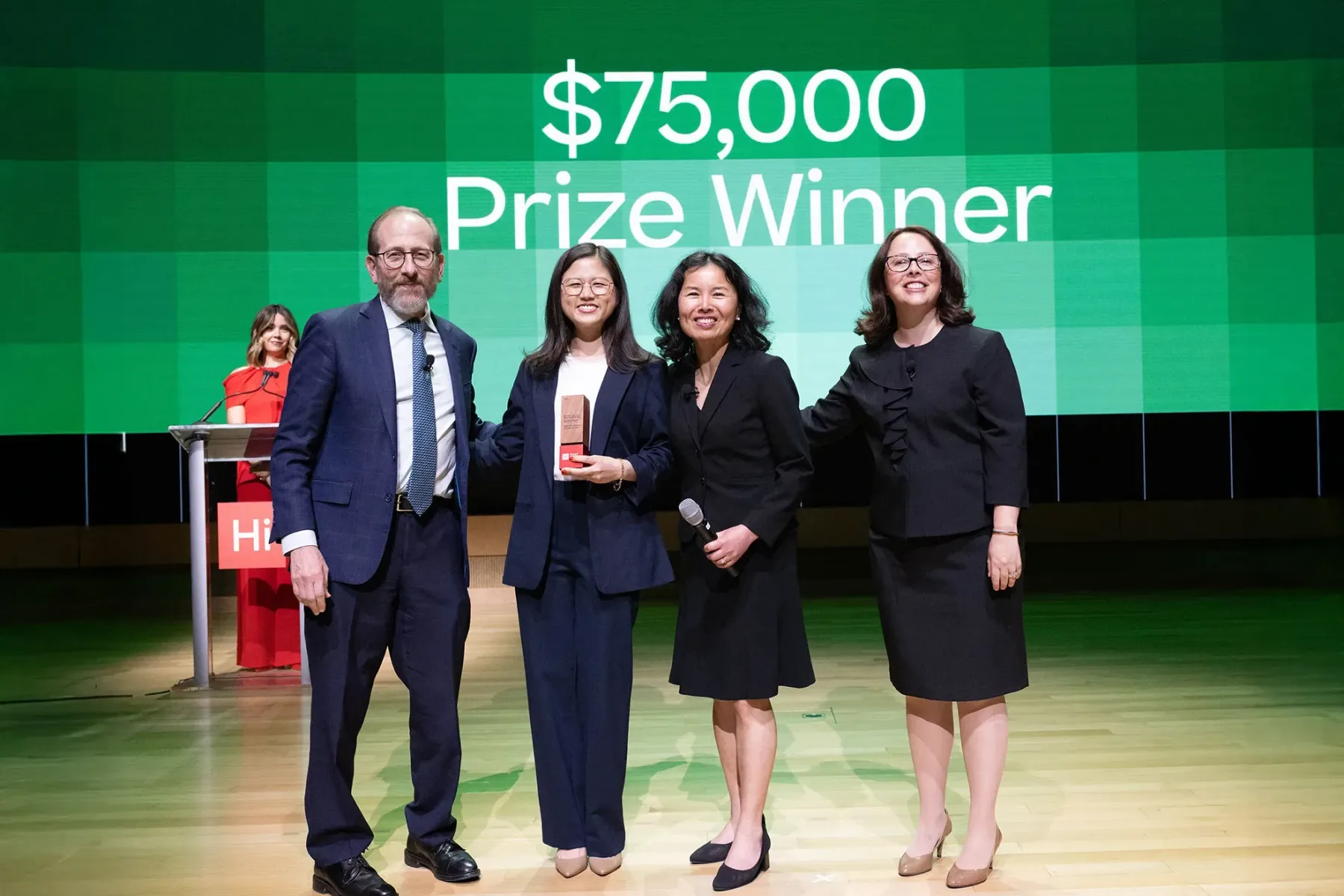It’s been one year since we launched our Women-Led Wednesdays series with the aim of elevating women founders’ voices in the Harvard Innovation Labs community all year long, not just during the month of March. The 20+ women featured so far have talked with us about their unique ventures, their team values, how gender affects (and doesn’t affect) their experience of entrepreneurship, the challenges and opportunities of starting a company in an almost completely virtual world, and more. Common themes also emerged, mostly around the continued lack of funding for women-led companies, particularly Black women-led companies, what it’s like being an entrepreneur who is also a parent, and the power of women’s networks and/or community.
As the Harvard community recognizes Women’s History Month with virtual events across campus and Harvard Business School celebrates the 50th anniversary of its Women’s Student Association, indeed there is much to celebrate and much more work to do. We pick up our Women-Led Wednesdays series this spring with appreciation for new resources from the Harvard Office for DIB and new work from the HBS Gender Initiative and a continued commitment to centering equity in our storytelling at the Harvard Innovation Labs. We will continue to update this edition with new founder interviews in the coming weeks.
Logan Brown: Spencer Jane
Logan Brown (Harvard Law School, Class of 2021) is founder of Spencer Jane, a startup that aims to simplify the shopping process for women on the hunt for the perfect pantsuit. Brown decided to create the company after her own frustrating experience hurriedly trying to find a suit during her first year at Harvard Law School. Motivated by more than a love of convenience, Brown also wants to create more ease for women who are busy building their careers. “Shopping for a suit ahead of an interview just adds another item to the ‘to-do’ list during what is already a stressful time,” Brown says. “I want women to feel their best, be confident, and not worry about what they are wearing.”
Brown is a participant in the Harvard Innovation Labs 2021 Spring Venture Program for student entrepreneurs. Spencer Jane’s signature blazer is machine washable, wrinkle resistant, and designed to be flattering on all body types. Unlike many women’s blazers, it even has pockets. After soft launching their first line of pre-sale items in February 2021, Spencer Jane has received positive press from The Harvard Crimson and The American Bar Association Journal and is gaining a following. As of early March, Brown’s Spencer Jane profile on TikTok had nearly 80k likes.
How do you and your team handle unforeseen challenges?
“Entrepreneurship is challenging and full of unforeseen problems! We try to remember our mission, keep going, and focus on our choices. Beyond that, I try to seek out mentors and advisors. Many of the challenges that startups face right now aren’t entirely new. We learn a lot by consulting with other founders and startup teams.”
What do you think the future for women entrepreneurs looks like?
“I think the future of entrepreneurship is female! I continue to be inspired by the innovations and ideas of my peers. I am excited to see women take-on the biggest problems in society and change the world. I think that there will also be more of a focus on improving the lives of women as women create solutions for problems in their own life. I also think work and office culture is changing for the better; women are creating a better professional environment.”

Debbie Lin Teodorescu: SurgiBox
Debbie Lin Teodorescu (Harvard Faculty of Arts and Sciences, Class of 2011; Graduate School of Arts and Sciences, Class of 2011; Harvard Medical School, Class of 2016) is founder of SURGIBOX Inc., the medical device company behind the SurgiBox, the futuristic “operating room in a backpack.” Surgical teams seal a clear, bubble-like surgical enclosure on the patient’s skin and operate through arm-ports, while material and lines are inserted through other ports. An environmental control unit inflates the enclosure with clean air and controls the internal environment, and the enclosure shields providers from bodily fluid splatters. SURGIBOX combines the benefits of state-of-the-art operating room ventilation with comprehensive protective equipment in a single, ultraportable package. SURGIBOX has effectively worked with end-users and field partners to co-develop a system that tackles sterility, meets provider protection needs, and integrates well into existing workflows.
The grand prize winner of Harvard Innovation Labs President’s Innovation Challenge in 2016, SURGIBOX is currently part of HIL’s Launch Lab X GEO program for Harvard alumni entrepreneurs. In 2021, they established a Quality Management System, a milestone toward certification as a medical device manufacturing firm compliant with the highest global standards. “We have the brilliant technical team and patented R&D to implement cost-effective, mil-grade technologies like automated environmental control, laminar airflow, total blood loss capture, auto-stabilization, and more,” says Teodorescu, “all in a package that feels like a familiar surgical drape.” After SURGIBOX was designated as a COVID-19 technology by the U.S. Air Force in 2020, Teodorescu engaged strategic partners to contribute to the public-private partnership funding required to expedite the development of SurgiBoxes for austere environments.
Teodorescu says she is proud to work alongside other leaders in her field who are improving access to safe surgery wherever it’s needed. For example, SURGIBOX has been able to contribute to the Saudi Academy of Sciences’ workshop on frontline provider-driven innovation and the “Emergency and Surgical Care in Universal Health Coverage” course from the Geneva Foundation for Medical Education and Research.
How do you and your team handle unforeseen challenges?
“One thing I internalized over the course of medical training is that ‘we don’t get paid extra to suffer.’ We diagnose and treat as a team rather than worry alone. Our team tackles challenges by asking three questions: 1) What is the full scope of the challenge and potential change from the existing planning? 2) What seem to be the options for addressing the situation? 3) Of these, what gives us the most favorable outcome? This helps us communicate productively as a team and across our broader network. It’s remarkable how scoping out a challenge properly can turn it into an opportunity.”
What do you think the future for women entrepreneurs looks like?
“When the accelerating problems of the world seem almost insurmountable–health inequality, climate change, and beyond–I’m so grateful to remember that women and girls around the world are joining the global brain trust at remarkable rates. The beautiful thing about entrepreneurship is that it needn’t be a zero-sum game: new paradigms, new platforms, new markets build value for everyone, including society at large. So, in blunt terms, the future for all entrepreneurs is tough, since the future is tough… But increasing the wealth of skills, experiences, and perspectives through, yes, expanding women’s entrepreneurship, helps ensure that the world will recover and advance faster. We need every smart and determined person tackling the big problems!”

Taylor Clarkson and Ruby Herrera: Mixed Millennial
Taylor Clarkson (Harvard Business School, Class of 2022) and Ruby Herrera are co-founders of Mixed Millennial, a community-oriented, purpose-driven jewelry brand. After meeting during a summer internship after freshman year at Cornell University, Clarkson and Herrera created their company to “celebrate mixed identity and empower those who identify as multiracial, multiethnic, and multicultural.” Participants in Harvard Innovation Labs Venture Program in 2020, their first product is a simple, elegant sterling silver and gold necklace representing the duality of the mixed experience. The juxtaposition represented by the necklace’s interlocking rings—different in size, shape, and color—is what makes it beautifully unique, just like the wearer.
A 100% Black-, Latinx- and women-owned brand, Mixed Millennial uses jewelry to address issues of identity and belonging. Their necklace is meant to be an everyday reminder to proudly wear the mixed identity. “Being mixed is an experience shared by many, but discussed by few,” they say. “While it’s an opportunity to bridge cultures, it’s also a struggle… Our goal is to connect people around the world through thoughtfully designed jewelry and conversation.” As the pandemic has forced Clarkson and Herrera to work together virtually on separate continents–Clarkson lives in Boston and Herrera lives in Sydney, Australia–the co-founders are staying flexible and creative in order to grow their business. Featured in Good Housekeeping in 2020, Mixed Millennial is currently focused on finding the right advisors and building partnerships with larger brands.
How do you and your team handle unforeseen challenges?
“We’ve learned to pivot and adjust our strategy while remaining dedicated to the community we serve. We use daily calls to discuss our quarterly planning, immediate action items, social media strategy, and evaluate our processes. We prioritize listening to our community by asking questions and starting important, sometimes uncomfortable conversations. We launched our venture during a global pandemic two months after a national outcry surrounding the treatment of Black lives. Using customer feedback and gaining a deep understanding of our audience has been critical in responding to and navigating unexpected challenges with tact.”
What do you think the future for women entrepreneurs looks like?
“We believe the future of entrepreneurship IS female. We often discuss the importance of mixed representation, and we know the same is true when it comes to women’s representation. There are more and more women leaders and women-led businesses, therefore more opportunities to see ourselves within the people we admire. We hope this representation coupled with more equitable funding for women and minority founders changes the future of entrepreneurship for the better.”

Erin Sharoni: Good Green
Erin Sharoni (Harvard Extension School, ALM 2021) is the Founder of Good Green, a startup that aims to help people eat more plants. Founded in 2020, the app and website rewards people for plant-based food purchases and provides information on alternatives to animal-based products. Why should people eat more plants? Sharoni, who studies biology and wrote her master’s thesis on epigenetics and longevity, says it’s a matter of science and survival. She reminds people that in 2019, the UN issued a Special Report: Climate Change and Land that calls for the world to eat less meat.
Sharoni decided to start Good Green when she learned that for the average American consumer, the biggest impediment to adopting a plant-based diet is perceived cost. Apart from cost, for some people who wish to eat more plants or go vegetarian, the challenge is primarily a social one; for example, integrating plant-based foods into family traditions. “We want to understand what consumers need most, first,” Sharoni says, “whether that is a reward system or a tool to more easily transition to a plant-based diet.” A participant in the Venture Program during the Fall 2020 and Spring 2021 semesters at Harvard Innovation Labs and still in the early stages of venture creation, Good Green recently received a Spark Grant, which Sharoni says will be immensely helpful for demand validation and user testing. People who are eager to download the Good Green app can sign up on a waitlist at hellogoodgreen.com.
How do you and your team handle unforeseen challenges?
“We’re new, so we have yet to see specific challenges outside of the glaringly obvious one that’s consumed the planet for the past 365 days. How have we dealt with that? Many, many long WhatsApp conversations and lots of love! Otherwise, most of my time is spent thinking about how the environment–the food we eat, how we live, where we live–impacts our genetic expression and ultimately, the health and longevity of our species and of this biosphere. Science shows us what’s in store if we don’t make a change.”
What do you think the future for women entrepreneurs looks like?
“I think the future is bright, however, this pandemic has highlighted inequities in our society. Women in the workforce have suffered immensely… This threatens to set women-led businesses back significantly if we do not remedy the root cause. It’s a systemic problem with a solution far bigger than any single effort. We start by recognizing that women cannot and should not be expected to be everything to everyone. Men don’t face the same set of expectations as women. Women entrepreneurs face the same business challenges as men and are often juggling significant familial burdens, be it child-rearing, pregnancy, or being the main caregiver for an elderly parent. Worse, investors are often harder on women, which sets the starting block back further.
Women must be afforded space and respect. We are not less capable or less focused because of burdens placed on us by either biology or society; we’re more resilient for it. We need a paradigm shift in what business looks like so that hard work is rewarded, but so is empathy, compassion, and quality of life. This is the future women entrepreneurs are building.”

Beth Ann Lopez: Docosan
Ms. Beth Ann Lopez (Harvard School of Public Health, Class of 2017) is Co-Founder and CEO of Docosan, a health tech startup dedicated to improving access to healthcare in Vietnam and beyond. Lopez and her co-founder, Natalia Moreno Hendrickson (Harvard College, Class of 2015), created Docosan in February 2020 to help people take charge of their own health and well-being while creating more transparency in the healthcare industry. In Vietnam, there are over 50,000 private clinics alone, so it isn’t easy finding the right provider.
On Docosan’s website or mobile app, patients can compare healthcare providers, book appointments, talk with primary care assistants, view their medical history, and manage their own health data for free. For doctors, Docosan’s Patient Management (CRM) and Cloud Appointment Management systems is an efficient way to connect with new patients. “I wish people knew how much we’re transforming healthcare here. Every time we get a booking and a positive review, it makes me so happy because easily finding quality healthcare can be a challenge, particularly in sectors like women’s health and mental health,” Lopez says. “The real-world impact we’re having is fantastic and really drives me.” A participant in the Harvard Innovation Labs LLX GEO accelerator, Docosan successfully raised over $1 million USD, one of the largest seed rounds for a health tech company in Vietnam.
How do you and your team handle unforeseen challenges?
“My team and I always take on challenges with an analytical and patient perspective. We are a sustainable, long-term business, and we really treasure our doctor and patient partners. The business is about expanding that pool while keeping our current doctor and patient partners as satisfied as possible. Healthcare in particular requires a diligent, meticulous approach to challenges. It’s not a sector where ‘move fast and break things’ is applicable.”
What do you believe the future for women entrepreneurs looks like?
“The future for women entrepreneurs is more positive than ever, however, it must be said that the bar is low. Within Southeast Asia and elsewhere, women entrepreneurs face many obstacles, doubts, and questions that men just don’t get. I’m cautiously optimistic though, particularly as a newer generation enters this space.”

Alisha and Natasha Nanji: AppBuddy
Alisha and Natasha Nanji (Harvard School of Dental Medicine, Class of 2023) are co-founders of AppBuddy, an online platform connecting students to application help from educational consultants and pre-screened students at their dream schools. It all started when the twin sisters began their own process of applying to college and graduate school and had difficulty finding application help from a source they found to be relatable. Now they are on a mission to make application help services more personalized, accessible, and effective.
Participants in the Harvard Innovation Labs Spring 2021 Venture Program and semifinalists in this year’s recent President’s Innovation Challenge, AppBuddy is currently working with 100+ freelance educational consultants who provide application help across North America. In January, AppBuddy was accepted into the League of Innovators Labs, a competitive accelerator founded by Hootsuite founder Ryan Holmes. Alisha and Natasha have grown a community of over 13,000 members and have been invited to speak at over 25 university clubs across the globe.
How do you and your team handle unforeseen challenges?
“Communication has been critical for our entire team. When challenges arise, we stay positive by keeping our big vision in mind and creating an environment where feedback is embraced. Entrepreneurship is often a rollercoaster. Although one may think that starting a startup with your twin sister is a recipe for disaster, we’ve figured out each other’s strengths and weaknesses. This allows us to divide and conquer and just to be honest.”
What do you think the future for women entrepreneurs looks like?
“The future is bright! Women will continue to spur innovation and transform industries. It’s exciting to see more women challenge the norms and pave the way for the next generation. The world needs more women entrepreneurs, as they create solutions to problems that their counterparts did not know existed. We envision a future where there are more than three women of color CEOs of Fortune 500 companies.”






